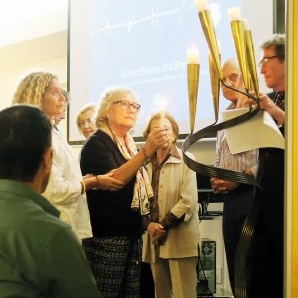
SA

Warsaw Ghetto eyewitness accounts bring history to life
TALI FEINBERG
Under the leadership of the enigmatic Dr Emanuel Ringelblum, these brave people wrote diaries, and collected papers, posters, photographs, art, music, and testimonies, despite the fact that they could be executed for doing this work.
Their story was turned into a documentary shown in more than 40 countries on Sunday to mark the United Nations International Day of Commemoration in Memory of the Victims of the Holocaust.
The Cape Town Holocaust & Genocide Centre took part in the worldwide screening premiere of the film Who Will Write Our History?.
The film explains that Nazi propaganda depicted Jews in the ghetto as vermin awaiting extermination, and Ringelblum realised that if he did not create a counter-narrative, this would be all that people would believe in years to come.
“As an historian, Ringelblum saw that a new historical moment was beginning, and that this was the most important story he would ever tell,” explains a narrator in the film.
But he could not do it alone. In heart-pounding scenes, we see his group meeting secretly, and deciding that writing what they saw around them would be their act of resistance. They met on Shabbat, and gave themselves the code-name Oneg Shabbos (Joy of Shabbat).
“Nothing is unimportant,” Ringelblum tells the group. His believed it was the everyday life and death around them that was vital to record, and that Jewish history is not only that of rabbis and philosophers, but also of the people on the street. “He loved the Jewish masses, and the language of the Jewish masses – Yiddish,” notes the film.
It was in many ways the first battle against “fake news”, and the realisation that the source of the story is as important as the news itself. Ringelblum knew that even if he and his group did not survive, their testimonies would be able to tell this story more genuinely than any Nazi propaganda.
What is so powerful about the documentary is that we see the characters speak the very words they wrote in their diaries. History is brought to life as we get inside the heads of people living through the Holocaust.
But as the Final Solution closes in on them, fewer and fewer of those voices survive. The great deportations take most of them to Treblinka. Those remaining in the ghetto decide to fight the Nazis in an uprising. The Jews of Warsaw fought off the Nazis for four weeks, holding them off longer than the Polish army did when Germany invaded Poland.
As the ghetto goes up in flames, the remaining archivists write their last wills and testaments, and the whole collection is buried deep within the ghetto, in metal boxes and milk jars. One 19-year-old who helped to bury the archive wrote, “I hope to live to see the time when the great treasure will be dug up, and scream the truth at the world.”
One of the last acts of resistance of the Oneg Shabbos archivists was to send a message through the Polish underground to London, where they shared what they had discovered about the gassing of Jews in the east. They had come to know about it from a survivor of Chelmno, who had made his way to Warsaw and told them about it. This survivor’s testimony is the first written account of the gassings at Chelmno, and is preserved in the Oneg Shabbos archive.
The message from Warsaw was read on the radio across Britain, and to them it was a great victory. But it was bittersweet, as the Jews of Poland were wiped out. Of the six million Jews who died in the Holocaust, half were Polish Jews. Only two Oneg Shabbos archivists survive.
After the war, two caches of the archive were dug up from deep under the rubble. One cache has still not been found. But the message of writing as an act of spiritual resistance, and the pen as mightier than the sword, is as relevant today as it was then, noted the Director of the South African Holocaust & Genocide Foundation, Richard Freedman.
To mark the commemoration, he called survivors to light candles of remembrance. Some of them had witnessed the very scenes depicted in the film. “I’m shaking… I heard Ringelblum speak to us in the ghetto,” said survivor Miriam Lichterman after the film.
The evening also included the award of the Marlene Silbert Prize to students graduating as educators, who wrote essays describing how they would teach the Holocaust in their classrooms. “This prize is about passing the baton onto the next generation,” said Freedman.
The audience was also addressed by UN Secretary General António Guterres, who noted that anti-Semitism was rising globally. “It falls to us to be ever vigilant,” he said. “Now more than ever, let us unite in the fight for universal values and build a world of equality for all.”




